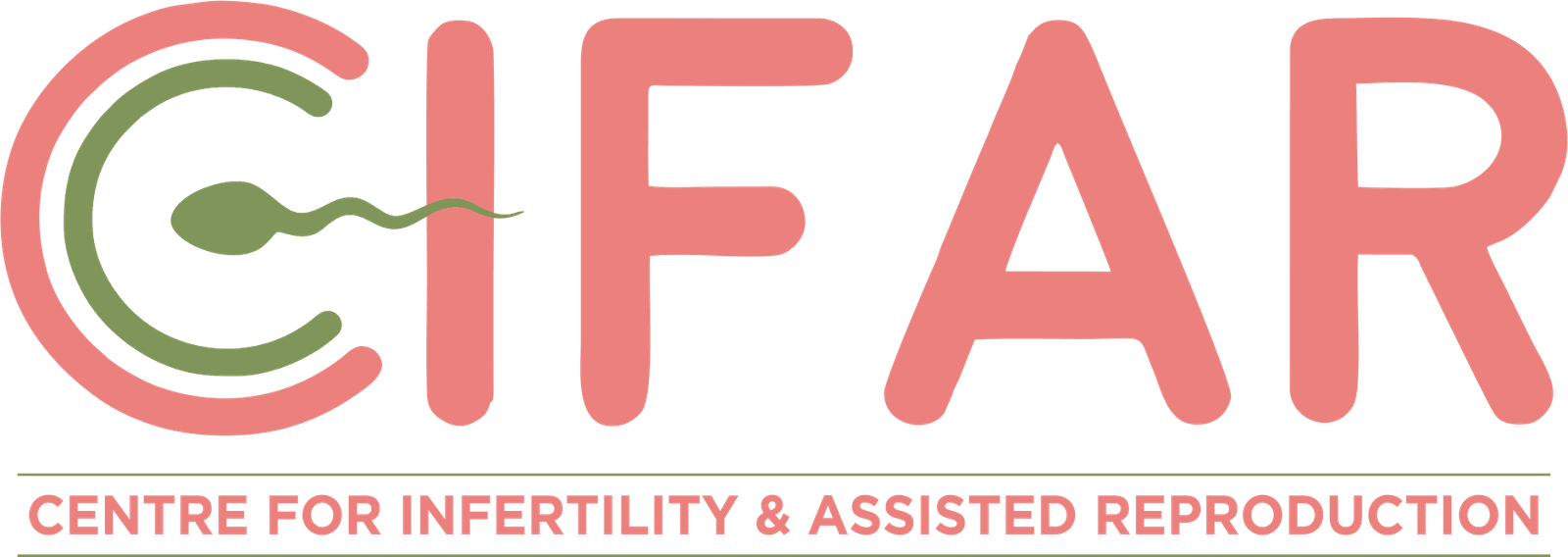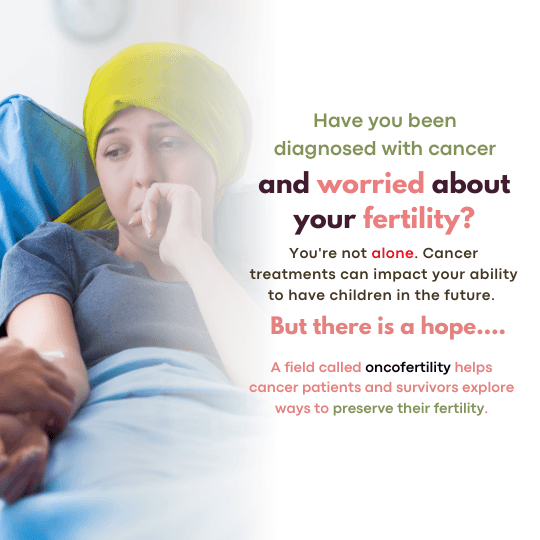Oncofertility
If you have recently been diagnosed with cancer, you are probably feeling a variety of emotions. One of them could be concern about how cancer and cancer treatment will influence your ability to have children.
If you have survived cancer, you may be experiencing fertility issues such as ovarian failure or decreased sperm production. Regardless of where you are in your cancer treatment, We at CIFAR – Centre for Infertility & Assisted Reproduction, Dr Puneet Rana Arora oncofertility & IVF experts provide streamlined consultations and sophisticated solutions to address your reproductive health concerns and help you become a parent.
What is Oncofertility?
Dr Punnet says Oncofertility is a medical sub-specialty that combines oncology, which studies and treats cancer, and reproductive endocrinology, which studies the hormone system and fertility. Its purpose is to assist cancer patients and survivors in maintaining their capacity to conceive children following cancer therapy.
Cancer therapies such as chemotherapy, radiation, and surgery can harm a person’s reproductive system. For women, this can result in ovarian damage, infertility, premature menopause, and other problems. Men may encounter sperm production issues. Oncofertility provides options for persons confronting this difficulty.
_________________________________________________________________________________
Fertility Preservation Options for Women
– Process: Hormonal stimulation of the ovaries to produce multiple eggs, retrieval of eggs, fertilization with sperm, and freezing of resulting embryos.
– Advantages: High success rates with established techniques.
– Considerations: Requires a male partner or sperm donor; may need 2-6 weeks to complete the process.
2. Oocyte (Egg) Cryopreservation:
– Process: Hormonal stimulation of the ovaries to produce multiple eggs, retrieval of eggs, and freezing of unfertilized eggs.
– Advantages: No need for a male partner or sperm donor at the time of preservation.
– Considerations: Success rates may be slightly lower than embryo cryopreservation; requires 2-3 weeks to complete the process.
3. Ovarian Tissue Cryopreservation:
– Process: Surgical removal and freezing of ovarian tissue. Later, the tissue can be reimplanted or used for in vitro maturation of eggs.
– Advantages: Can be done quickly; suitable for prepubescent girls and women who cannot delay cancer treatment.
– Considerations: limited availability.
4. Ovarian Suppression:
– Process: Use of medications (e.g., GnRH agonists) to temporarily suppress ovarian function during chemotherapy.
– Advantages: Non-surgical; can be started quickly.
– Considerations: Effectiveness is still under study; may not be suitable for all patients.
5. In Vitro Maturation (IVM):
– Process: Retrieval of immature eggs from the ovaries, maturation in the laboratory, and freezing of matured eggs.
– Advantages: Useful for patients who cannot undergo standard ovarian stimulation.
– Considerations: Less established than other methods; may have lower success rates.
Fertility Preservation Options for Men
1. Sperm Cryopreservation:
– Process: Collection of a semen sample through ejaculation and freezing of the sperm.
– Advantages: Established and effective technique; quick and non-invasive.
– Considerations: Requires ability to produce a semen sample; multiple samples can be collected to increase chances of future success.
2. Testicular Sperm Extraction (TESE):
– Process: Surgical extraction of sperm directly from the testicles for men who cannot produce a semen sample.
– Advantages: Can be used when no sperm is present in the ejaculate.
– Considerations: Invasive procedure; may require general anesthesia.
3. Testicular Tissue Cryopreservation:
– Process: Surgical removal and freezing of testicular tissue, which contains sperm-producing cells.
– Advantages: Suitable for prepubescent boys who cannot produce sperm.
– Considerations: Experimental; future use involves maturation of sperm cells in the lab.
Each fertility preservation option has its benefits and considerations, and the choice depends on individual circumstances, including age, type of cancer, treatment plan, and personal preferences. Consulting with a reproductive specialist and an oncologist is essential to make informed decisions about fertility preservation.
__________________________________________________________________________________
Here are some ways oncofertility can help:
✔️Embryo freezing: Mature eggs are retrieved from the ovaries, fertilized with sperm, and frozen for later use in in vitro fertilization (IVF).
✔️Egg freezing: Mature eggs are retrieved from the ovaries, frozen, and used later for fertilization and IVF.
✔️Ovarian tissue freezing: Strips of ovarian tissue are removed and frozen. Later, the tissue can be transplanted back into the body, where it may begin to function again and produce eggs.
✔️Sperm freezing: Sperm is retrieved through ejaculation and frozen for later use in fertility treatments like intrauterine insemination (IUI) or IVF.
✔️Testicular tissue freezing: Similar to ovarian tissue freezing, testicular tissue can be removed and frozen. Later, it may be transplanted back into the body to resume sperm production.
It’s important to note that oncofertility is a relatively new field, and the success rates of some procedures are still being studied. If you are facing a cancer diagnosis and are concerned about your fertility, talk to your doctor about oncofertility options.
Why is oncofertility important?
Oncofertility is important because it addresses the fertility concerns and reproductive health of cancer patients. Here are several reasons why oncofertility is critical:
1. Preserving Fertility: Many cancer therapies, including chemotherapy and radiation, can impair fertility. Oncofertility offers strategies for preserving fertility before treatment begins, letting patients to have biological children in the future.
2. Quality of Life: Fertility preservation can significantly improve the quality of life for cancer survivors. The ability to have children can be an important aspect of a person’s future plans and overall well-being.
3. Psychological Benefits: Knowing that they have options for having children in the future can reduce anxiety and improve the mental health of cancer patients. It offers hope and a sense of normalcy during a challenging time.
4. Advancements in Reproductive Medicine: Oncofertility drives advancements in reproductive technologies and techniques. Research in this field can lead to better fertility preservation methods and improved outcomes for patients.
5. Comprehensive Cancer Care: Incorporating oncofertility into cancer care ensures a more holistic approach. It addresses not just the immediate medical needs but also the long-term health and personal desires of patients.
6. Awareness and Education: Oncofertility raises awareness about the impact of cancer treatments on fertility and encourages healthcare providers to discuss fertility preservation options with patients early in their treatment planning.
Overall, oncofertility is an important element of cancer care that allows patients to have happy lives, including the option of having children following cancer treatment.
How does oncofertility treatment at CIFAR help cancer patients?
The CIFAR-Center for Infertility and Assisted Reproduction, led by Dr. Puneet Rana Arora, an expert in IVF and Oncofertility, offers comprehensive oncofertility services. These services aim to assist individuals with cancer in preserving their fertility before, during, and after cancer treatment.
CIFAR provides a range of services that enable cancer patients preserve their fertility and maintain the option of having biological children in the future. This addresses both their current medical needs and their long-term reproductive ambitions.
- https://www.aspirefertility.com/fertility-treatment/fertility-preservation/oncofertility
- https://www.uchicagomedicine.org/conditions-services/obgyn/fertility-infertility-reproductive-medicine/cancer
- https://dallasivf.com/fertility-treatments/fertility-preservation-oncofertility/


Add Your Comment